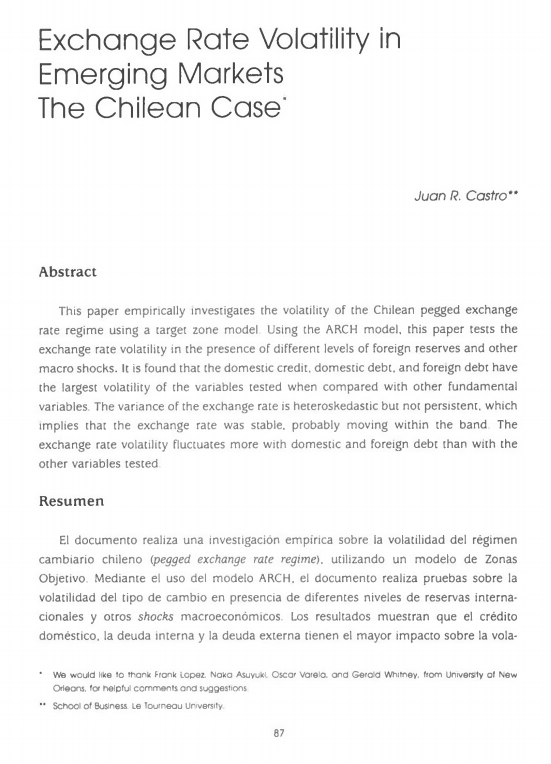Exchange Rate Volatility in Emerging Markets: The Chilean Case
DOI:
https://doi.org/10.35319/lajed.20078191Keywords:
Chilean economy, ARCH model, Macroeconomic shock, Exchange rate volatilityAbstract
This paper empirically investigates the volatility of the Chilean pegged exchange rate regime using a target zone model. Using the ARCH model, this paper tests the exchange rate volatility in the presence of different levels of foreign reserves and other macro shocks. It is found that the domestic credit, domestic debt, and foreign debt have the largest volatility of the variables tested when compared with other fundamental variables. The variance of the exchange rate is heteroskedastic but not persistent, which implies that the exchange rate was stable, probably moving within the band. The exchange rate volatility fluctuates more with domestic and foreign debt than with the other variables tested.Downloads
References
Bosworth Barry, Rudiger Donbusch and Raul Laban. 1994. The Chilean Economy Policy. Lessons and Challenges. The Brookings institution, Washington. D.C.
Delgado, Francisco and Bernard Dumas. 1993. "Monetary contracting between central banks and the design of sustainable exchange rates zones". Journal of International Economics. 34, 201-224.
Engle, Robert F. 1982. “Autoregressive Conditional Heteroscedasticity with Estimates of the Variance of United Kingdom Inflation". Econometrica. 50:987-1007.
Flood Robert, and Andrew Rose. 1991. "An empirical exploration of Exchange rate target zones" Carnagie-Rochester Series on Public Policy, Fall, 35, 7-66
Krugman, Paul R. August. 1991. "Target zones and Exchange rate dynamics" QuarterlyJournal of Economics. Vol. 106, N° 3, 669 - 682
Krugman, Paul and Marcus Miller. 1991. "Speculative Attacks on Target Zones". Oxford: Oxford University Press.
Lewis, Karen. 1995. "Occasional Interventions to Target Rates". The American Economic Review. September P. 691-715.
Svensson, Lars E. 1991. "Target zones and interest rate variability.” Journal of International Economics. N° 31. 27 - 54.
Svensson, Lars E. 1994. "How long do Unilateral target zones last?". Journal of International Economics. Vol. 36, 467 - 481.
Werner, Alejandro M. 1995. "Exchange rate target zones, realignments and interest rate differentials Theory and evidence".Journal of International Economics. Vol. 39, 353 - 367.






